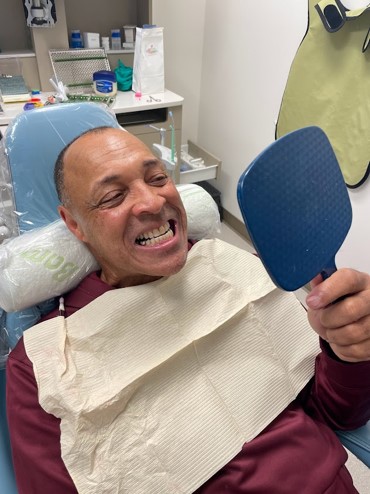
Veteran looks at teeth in dental chair at D4V
It’s a nationwide problem for our nation’s heroes: Veterans struggle to get access to oral health care. For a veteran to get dental benefits from the US Department of Veterans Affairs (VA), they need to have been a former prisoner of war, be 100% disabled, or have a service-related dental injury. Out of the 9 million veterans who are eligible for medical care through VA, 80% are not eligible for dental coverage or care.
To repeat: 80% are not eligible.
The consequences? Compared to non-veterans, veterans have consistently higher rates of gum disease, missing teeth, and filled teeth. And veterans are more likely to have chronic conditions such as diabetes and heart disease that are associated with poor oral health and often lead to higher out-of-pocket costs for patients.
“For a number of reasons, many veterans don’t have insurance through the VA,” says Lisa Platt, the Executive Director at Mercy Foundation in Oregon. “So, they can’t go over to their local VA hospital to receive care.”
Even eligible veterans have significant barriers to accessing care: (1) There are geographic barriers due to the distance between VA centers that provide dental care, and some veterans may have no way to travel to those centers; and (2) if a veteran goes to a community provider, the VA approval process can be long, frustrating, and filled with paperwork.
“For veterans living on the central coast of California, there are 355 miles between the two closest VA hospitals where dental care is provided, one being in Palo Alto and the other being in LA,” says Patricia Yellich, the Executive Director and Co-founder of Dentistry4Vets (D4V). “So, what do you do with the 35,000-plus veterans living on that coast?”
Both D4V and Mercy Foundation, grantees of CareQuest Institute, are working to improve veterans’ access to oral health care. Last year, the Institute put a unique focus on veteran oral health, awarding 10 organizations $125,000 each to help them take action to improve access to oral health care for our nation’s heroes.
Partnering with Veterans in Local Communities
Dentistry4Vets
At D4V, a nonprofit dental clinic in Marina, California, veterans and their spouses can receive continuity of dental care from a full-time dedicated staff of dentists and registered dental assistants, comprehensive dental care with access to dental specialists, and emergency dental care.
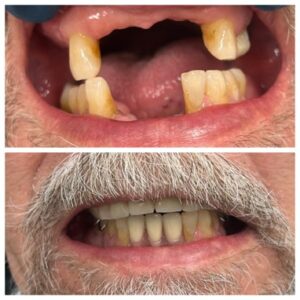
A veteran’s teeth before and after going to D4V for dental care
“About 50% of our patients have had no continuity of dental care for various reasons,” Yellich says. “So, we need to establish a comprehensive dental plan to achieve (1) treating the aesthetic zone, which is what people see when you smile and speak; (2) treating occlusion, which is how molars come together to chew food; and (3) treating infections, which includes education and a solid hygiene schedule. Many of our patients need dental specialists. We cannot just schedule a cleaning on a new patient until we complete an exam with X-rays and a full health history.”
“Over 50% of our patients are age 67 and older,” she says. “About 25%–30% of them have a form of disability, either physical and/or mental disability. About 30% of them have an underlying health issue. Usually, it’s heart disease or diabetes.”
With CareQuest Institute funding, Yellich and veterans with D4V traveled to Washington, DC, to talk to Congress about veteran dental care and potential solutions that could help them. She says the current model of care for veterans isn’t working, especially for veterans who aren’t fully covered by the VA and are on Medicare or Medicaid.
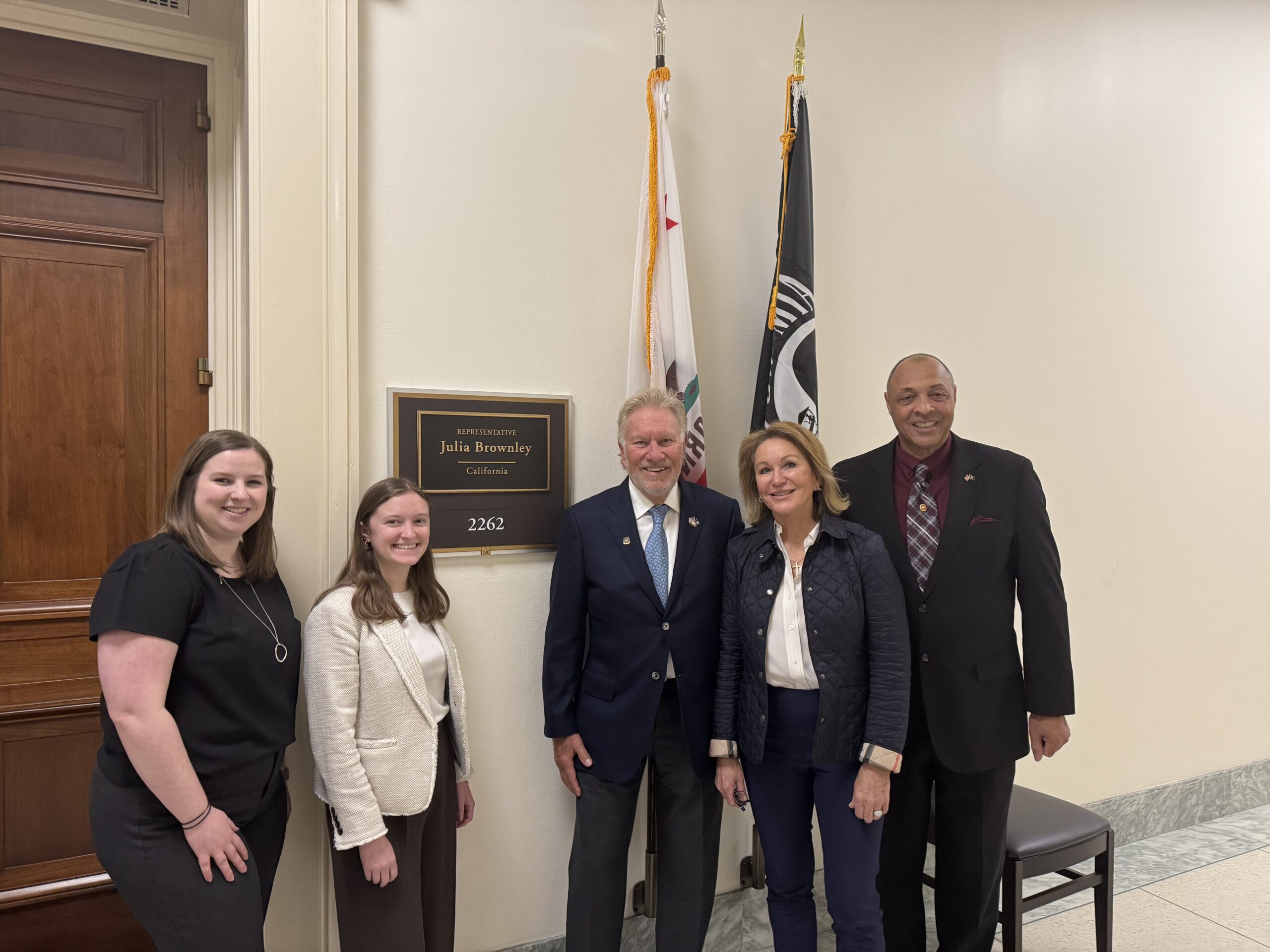
D4V representatives in Washington, DC
“It doesn’t really take care of our veterans the way they should be taken care of,” Yellich says. “The issue with Medi-Cal (California Medicaid) is that a veteran can go into an office to get dental care, but the care is extremely limited. It’s basically what we call a Band-Aid approach. It isn’t continuity of care and comprehensive dental care.”
Yellich says the CareQuest Institute grant also allowed D4V to conduct research on how veterans get their oral health care, develop a blueprint of the D4V model to show how the organization takes care of its veterans, and highlight the positive outcomes achieved through the program.
She gathered dozens of testimonials of veterans who received care from D4V — many with low self-esteem, dental anxiety, and difficulty eating because of their poor oral health.
Mercy Foundation
In 2023, Mercy Foundation started an in-patient dental program at Mercy Medical Center and hired an expanded practice dental hygienist (EPDH) and dental assistant. The medical team at the hospital was also educated to look out for potential oral health problems and alert the hygienist.
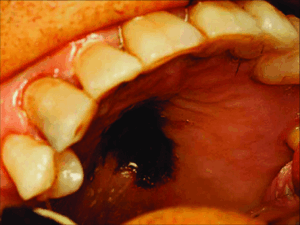
Growth found in a veteran’s mouth by EPDH at Mercy Medical Center
When the dental professionals would look at people who had chronic diseases, like heart disease and diabetes, or patients in the ICU or PCU, they noticed many also had oral health problems — and many of them were veterans.
“We were horrified to learn that we have a significant VA population that doesn’t necessarily have insurance through the VA,” Platt says.
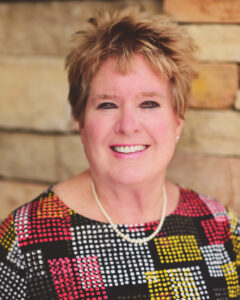
Lisa Platt, Executive Director of Mercy Foundation
The hygienist and assistant provide patients with preventive care, like fluoride varnish, silver diamine fluoride (SDF), sealants, and education. They teach veterans about proper hygiene and how to take care of their oral health properly.
“Sometimes having someone who is as dedicated as our hygienist and her dental assistant willing to walk people through the process is all it takes,” says Shawn Watson, Grant Manager and Writer at Mercy Foundation. “They feel like somebody’s listening to them. They don’t feel like they’re just a number in a system.”
Mercy Foundation is using the CareQuest Institute funds to help pay for a percentage of the preventive care supplies and a percentage of the hygienist’s salary.
“One of the things that [the hygienist] really brought to the table was an attitude about oral health being a public health issue, so we really felt that we were fortunate to get her,” Watson says. “It’s important that we retain her because it’s a hard position to fill and, more importantly, she’s doing a great job.”
The foundation also is using the funds to do outreach — having their hygienist and assistant go to the Oregon Department of Human Services to talk to veterans about the importance of oral health care and give out hygiene kits.
Ideas to Improve Veteran Oral Health
Both Mercy Foundation and D4V have been able to collaborate and learn from other grantees in the CareQuest Institute cohort who are helping veterans get the oral health care they deserve.
“We recognize it does take a village to keep our community healthy,” Platt says. “So, any which way we can work together to make that happen, we’re in.”
And there’s a lot more work that needs to be done.
“They’ve done so much for us. Why aren’t we taking care of them?” Platt says.
Yellich thinks a solution could be for the federal government to give all veterans an annual voucher that could be used specifically for dental care.
“I really wish I could talk to everybody in Congress,” Yellich says. “We don’t really need to fund a bill to do more research on facts that we already know to be true. The funding should be dedicated to solving the foundational problem, which is a lack of dental care to veterans. There are funds available; it is just a matter of how they are spent.”
And Watson believes federal leaders need to act, but she knows it’s not going to be easy.
“I think that is really going to be an uphill battle,” Watson says. “It’s one thing to pay lip service to the contributions of veterans. It seems to be another to fund these programs.”
To learn more about veteran oral health, go to carequest.org/veteran-oral-health.
